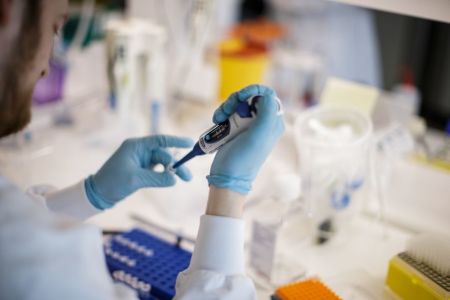Bioethicists warn against potential COVID-19 vaccines using cells from aborted babies

Christian bioethicists in the United Kingdom and the United States are warning against a potential coronavirus vaccine in which British scientists are using fetal cells from aborted babies.
According to CruxNow Tuesday, some ethicists are concerned the vaccine being developed at Oxford University is using cell lines that were obtained from an aborted child in the early 1970s.
Both the HEK 293 used at Oxford and the PER C6 cell line from the 1980s trace their origin from tissue from an aborted child, the outlet reported.
The push to develop a vaccine that will stem the deadly virus has intensified as infection rates and deaths have spread around the globe, particularly as some are warning of a second wave coming later this year. Given the attention, Catholic bioethics centers have recently published papers on the subject.
“Simply as a matter of fact, use of such cell-lines in COVID-19 vaccine production is likely to create problems of conscience for some of those to whom the vaccine is offered, and who become aware of its history … Conscientious objection on the part of potential vaccine recipients creates its own ethical demands for decision-makers, including those who do not themselves share the objection in question," the document from the Anscombe Bioethics Centre, which is based at Oxford, said.
"Such concerns should be viewed with particular sympathy in the area of abortion, bearing in mind that even those who do not object to all abortions may well object to the particular abortion from which a fetal cell line was derived."
In the United States, California Attorney General Xavier Becerra led a coalition of states in late March, urging President Trump to end his ban, which was enacted in June, on federally-funded research on fetal tissue that was procured from abortions in order to help scientists find a vaccine. Becerra argued that scientists at the National Institutes of Health had been hampered by the restriction and the attorneys general in his coalition said that fetal tissue research led to the development of vaccines for other diseases such as polio, rubella and measles.
Religious leaders and bioethicists in the U.S. are also denouncing the prospect of a COVID-19 vaccine developed with cell lines from aborted fetuses.
Citing Pope Emeritus Benedict XVI's words in a 1987 letter, Catholic Bishop Joseph E. Strickland wrote in an April 23 pastoral letter that “what is technically possible is not for that very reason morally admissible.”
"Just because the crime of abortion is considered legal in our nation does not mean it is morally permissible to use the dead bodies of these children to cure a global pandemic. Emphatically, this practice is evil," Strickland wrote, stressing that other ethical means are available and can prove to be just as effective in developing vaccines.
"Scientists I’ve spoken with assure me that there is no medical necessity for using aborted children in order to develop the much-needed vaccine to protect us from this particular strain of coronavirus," he said.
Joseph Meaney, president of the Philadelphia-based National Catholic Bioethics Center, said in an interview with Crux that it should be insisted that ethical scientific research have no links to abortion or the destruction of embryos.
Using cell lines obtained from aborted babies for a coronavirus vaccine “is a cause of serious theological scandal,” the NCBC said in a paper of its own on the topic.
“Appealing to good aims and an ‘urgent need’ will foster the deeper penetration of unethical research and development into medicine, politics, law, and culture,” the paper said.
According to a January 2017 article from the Bioethics Observatory Institute of Life Sciences at the Catholic University of Valencia, some vaccines "consist of dead or attenuated live viruses that are introduced into a patient’s body to activate the body’s defenses against that virus without becoming ill. Thus, if the patient subsequently enters into contact with the live virus, it will be unable infect him, since he has the necessary defenses to cope with it, i.e. he is immunized."
When preparing vaccines, the viruses have to be cultured in cells in the labs, the article explains.
"The ethical difficulty appears when these cells come from surgically-aborted human foetuse. Similarly, the viruses themselves can be obtained from aborted foetuses that have been infected with a particular virus.
"The most widely used foetal cells are WI-38 and MRC-5. The WI-38 cells were derived by Leonard Hayflick in 1962 from the lung of a 3-month female foetus [2].The initials WI refer to the Wistar Institute, a body of the University of Pennsylvania, Philadelphia, and number 38 to the foetus from which the cells were obtained. The MRC-5 cells were obtained in 1966 from the lungs of a 14-week male foetus [3].The initials MRC indicate Medical Research Council, a body from London."





















